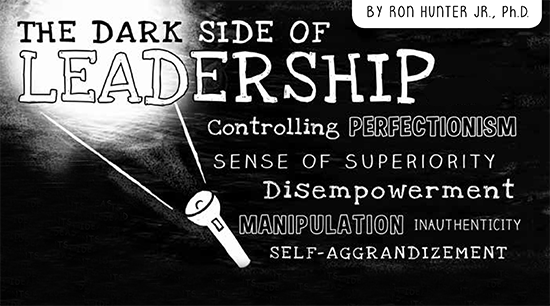
October-
November 2017
The Work Goes On
------------------
|






The column "Leadership Whiteboard" provides a short visual leadership coaching moment. It introduces and explains a new sketch in each issue, provides leadership coaching for further development, and shares a leadership quote and recommended book.
The "Dark Side" of Leadership
For example, to consider oneself a leader, he must possess a degree of narcissism because he believes he has the capability to lead peers. While a healthy ego is not negative, unchecked narcissism reveals the dark side of leadership. Other dark side tendencies could include self-aggrandizement, a sense of superiority, perfectionism, manipulation, and hypocrisy, among others.
What type of leader operates on the dark side? Leaders who possess a sense of superiority often have a high level of intelligence and believe their position precludes anyone from questioning their directives. Unless the situation demands a crisis level leadership response, one should be slower to issue orders and spend time formulating a strategy that involves and improves the culture of the organization. Interaction precedes directives.

After hearing from various perspectives, a leader is still responsible for the final call, but leaders should seek right outcomes over being right. Allowing people to point out weaknesses in an idea, direction, or initiative will only make it stronger. Sadly, many leaders do not possess the self-confidence to listen to the criticism of their followers. Take a page from thinkers like Socrates, Plato, and Aquinas who could argue and critically address problems without attacking the person holding this view. Even these greats knew they were not the smartest person in the room on every topic.
The dark side also appeals to “controlling leaders,” an oxymoron. Leaders do not control; they influence, inspire, and invest in the people around them. Controlling leaders make everything about their own goals, position, and way of doing things. What do we call a controlling leader? A dictator. Because of purpose or mission, few would equate pastors, denominational leaders, or deacons to Noriega, Castro, Stalin, Mao, Bin Laden, Mussolini, or even Hitler, but their philosophy of leading may bear some striking resemblance.
Controlling leaders of the 19th century used whips and weapons; those in the early to mid 20th century used titles and threats; but today, leaders intimidate with suggestive words that demean or bully to get their way. When one suggests you are not as wise, holy, prudent, smart, or any other comparative word, his behavior is verbal bullying. Controlling leaders are those who always want to be right, exhibit conscious or unconscious condescension, rely on verbal bullying, and using people as means to an end rather than the end itself.
Recommended Book
Leadership Quote
"Great minds talk about ideas, average minds about events, and small minds about other people." —Eleanor Roosevelt
About the Columnist: Ron Hunter Jr. has served as the director of Randall House Publications for 14 years, and has led the organization into family ministry initiatives for the past 12 years.
|
|

